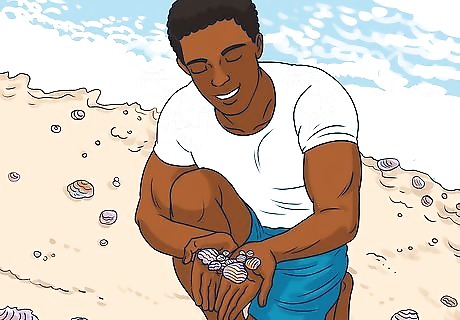
views
Searching for Hobby Ideas

Begin a collection. Many different collections can be started with little to no cost. One way to do this is to go outside. Look for rocks, plant leaves and flowers, or insects you can preserve and keep on display. Take a walk down to a beach and look for sea glass. Another way is to begin to invest in an object you wish to collect, such as saving bottle-caps you’ve found on the ground or gotten from your beverages. Others can help you begin or grow a collection by bringing you items such as coins or snow globes back home as gifts. Also consider buying a book on collectibles or joining a club of fellow enthusiasts.

Start an art or craft project. Many arts and crafts can be started with few materials. Writing, sculpting, drawing, and more will likely be available to you simply by using what you already have on hand. In addition, you can go to various stores, including dollar and thrift stores, to supplement your projects with cheap material such as scrap wood, fabrics, or metal. Search for craft projects on sites such as craftster.org or Pinterest and join art groups on Reddit. Look around your house before you begin. Often unused material can give you an idea for a project or help you complete one at low cost. You can use old electronics, wood, fabric, or paint to make miniatures, for example. Retail stores have some cheap supplies, such as coloring books and paint-by-numbers kits. Hobby stores will also have kits that can help you start doing activities such as building model planes or whittling.

Study something new. Think of a subject you’d like to learn. Search out the institutions in your area. Your local community center or library may offer free classes on anything from square dancing to programming, but you can also search local colleges and businesses for inexpensive classes. Sites such as khanacademy.org and coursera.org offer free classes on a variety of subjects. Youtube, podcasts, and phone applications are a great way to start. For example, try the free Duolingo application to learn a language.

Listen to music. Youtube contains a vast quantity of music you can listen to for free. In addition, you can discover music you like by using online radio stations or services including Pandora and Spotify. By taking time to expose yourself to new music, you can turn music into a relaxing hobby without having to by albums. Afterwards, you can go onto a discussion site such as sputnikmusic.com to rate and review music.

Play music. Singing is an activity you can get into before you make a purchase. Sites such as karasongs.com are a place to start to find free karaoke tracks. To learn an instrument, you can also borrow or buy a used or beginner instrument and try to teach yourself using beginner books or a site such as guitarlessons.com

Venture into nature. The world outside has a lot of hobbies you can start with no cost. Explore the surrounding landscape with hiking or geocaching. Watch birds, look at the stars, go camping, or garden at home. Use geocaching.com to download coordinates of capsules you can track down around your environment.

Get active. Search your area for local activities such as sports leagues or yoga shops. Many times these are free or cheap community-driven activities. You can also find or organize pickup games in public parks. Ride a bicycle around the community, learn to juggle, or sign up for a martial art at the YMCA. If you close the beach go bodysurfing or, bodyboarding.

Learn a game. Games are like sports and often benefit from being shared in the community. Game groups will often supply board games or video games at no cost to you. In addition, libraries and schools may have video game groups for children and adults. You can also play a wide variety of games online or play card games with people around you. Use a site such as meetup.com to see what groups are in your area.
Picking Cheap Hobbies

Pick an activity that fits your personality. If you can think of a personal interest to explore right away, you have an easy place to start. Otherwise, try to think of a hobby that might appeal to you. Think of what makes you feel good or creative now. What feels fun? What did you like to do in the past? Focus on these answers and start exploring how you can start the hobby at a reduced cost. Remember that you can change focuses as you go. Don’t be afraid to try out different hobbies. Borrow equipment or sell what you don’t need.

Choose a hobby you can monetize. A hobby that makes you money pays for itself. Many of these, such as needlework, don’t require much of investment to begin. Others, such as reselling, may require a more intensive investment to start but pay for themselves in time. Many hobbies have the potential to be monetized. The first goal with a hobby should be enjoying yourself. For example, when writing a blog or making online videos, don’t expect to get paid. It may never happen.

Transform an activity you already do. Something you already have to do can be adapted into a hobby. You will have to cook to be able to eat, but you can make cooking a passion using recipes that utilize low-cost ingredients. These activities can add to your life, making small expenses worth it. Other examples include couponing and thrift shopping to make a hobby out of saving money on necessities.

Ask experts how to begin. Go online, to class teachers, or find hobbyists and ask those who are experienced in your potential hobby for the minimum cost of materials you need to start. This will help you judge whether or not a hobby fits into your budget. You’ll often be surprised that you don’t need as much equipment as you imagined. Many of them will have tips on how you can save more money. They were in your position at one time.
Making Your Hobby More Affordable

Utilize home material. Look around you before you begin a hobby. See what you can use out of the materials laying around your house. Do it yourself craftsmanship means you can fix your home, repair broken materials such as computers, or make objects you can give away or sell. Use your imagination. Get creative with the material you have. For example, you can shape a figurine out of old wood or metal. Look online for ideas if necessary. Writing and journaling can also be done with little to no added expense by using any stray paper, notebooks, or a computer.

Buy cheap material. You don’t need to go all out to fund your hobby. Home crafting hobbies can be done for very little. Go online to a site such as eBay or a bulk store to get a lot of material at once. You can also purchase used clothing or get fabric scraps from a fabric shop for needlework hobbies such as sewing, for example. A cheaper option for a technology hobby is to rebuild old or broken computers. You can buy a computer or get it from someone you know. Selling creative products you make from cheap material helps you continue to fund your hobbies. You can always find beginner kits, such as paint-by-number sets or guitars that cost a fraction of an official model. These can be found at retail stores.

Borrow equipment. Equipment costs don’t have to get in the way of finding a hobby. At first you can rent the necessary equipment and try out your hobby. You may be able to find a "Library of Things" or a tool library in your local area to borrow equipment from. If you wish to continue with the hobby, you can continue to rent until you wish to buy your own equipment. Speak to people involved in your hobby to find places to rent equipment or try to borrow from people you know. Renting is useful for outdoor hobbies such as skiing or kayaking. Renting can also help you down the road for situational problems during your hobby, such as when you require a specific tool to use once in metalworking or gardening. Groups are also good for borrowing equipment. For instance, in a board game group, you can enjoy the games others bring without having to supply any games yourself. Computer companies also offer month-long trial versions of their products. Photo editors, for instance, can download Photoshop and buy after the trial.

Obtain used or beginner equipment. If you can’t or don’t want to borrow, you can always get your own equipment. Thanks to the Internet, reseller websites are everywhere. This makes it very easy for you to get anything from a working musical instrument to a soldering iron to books and video games to test or continue your hobby.

Ask for help. Many hobbies also begin by a parent or friend bringing home a gift. If there’s a hobby you are thinking of trying or continuing, someone else may be able to help you. This is good for collecting. If you’re interested in stamps, you can have friends and family save some for you and bring back more when they travel. Online communities are also good ways to get into hobbies. Some people will be willing to send you stamps or exchange yours for other ones, for example.
















Comments
0 comment